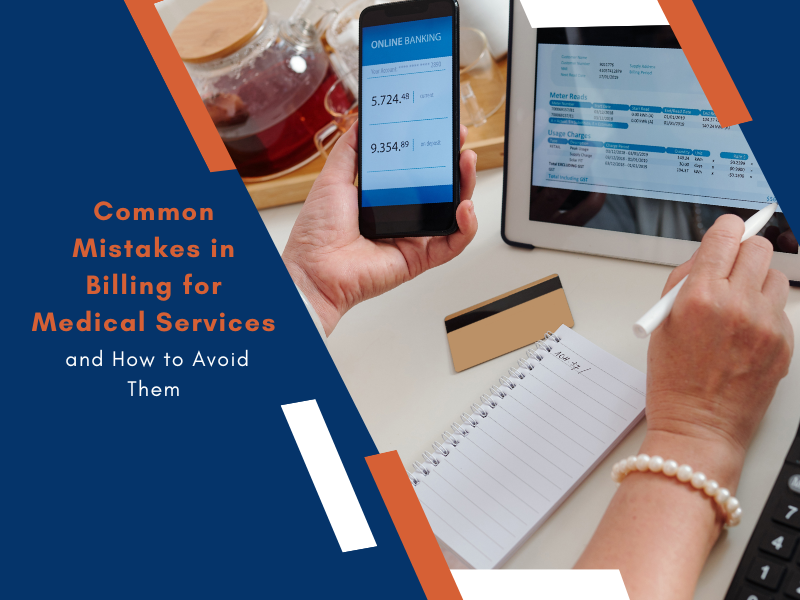Billing for medical services is a critical component of the healthcare system. It ensures that healthcare providers are compensated for their services while helping patients receive the benefits they are entitled to. However, mistakes in medical billing can lead to claim denials, delayed payments, or even compliance issues. These errors can be costly, both financially and operationally, for medical practices. Understanding common mistakes and implementing preventive strategies can help providers streamline their billing processes and avoid unnecessary headaches.
1. Inaccurate Patient Information
One of the most frequent errors in billing for medical services is inaccurate patient information. Details like the patient’s name, date of birth, or insurance policy number must match exactly with what is on file with the insurance company. A small discrepancy can lead to claim rejection.
How to Avoid It:
- Train front-office staff to double-check all patient information during registration.
- Use software tools that flag incomplete or mismatched entries before claim submission.
- Implement regular audits to ensure accuracy in patient records.
2. Coding Errors
Medical coding errors, such as the use of incorrect codes, upcoding, or undercoding, are significant contributors to claim denials. Incorrect codes may fail to convey the medical necessity of the services provided, leading to rejected claims.
How to Avoid It:
- Ensure your staff is well-trained in the latest ICD, CPT, and HCPCS coding standards.
- Utilize coding software or partner with certified medical coders to reduce human error.
- Perform periodic audits to verify that the codes used align with the services provided.
3. Missing or Insufficient Documentation
Insurance companies require detailed documentation to justify billed services. Missing or incomplete documentation can result in claim rejections or audits.
How to Avoid It:
- Develop a standardized documentation process that ensures every service is properly recorded.
- Train providers and staff to document all necessary information, including patient history, procedures performed, and diagnoses.
- Conduct regular reviews to ensure compliance with payer requirements.
4. Failure to Verify Insurance Eligibility
Submitting claims without verifying insurance eligibility is a common yet avoidable mistake. Patients’ insurance policies may change, expire, or have specific exclusions, making prior verification crucial.
How to Avoid It:
- Verify insurance coverage at every patient visit.
- Use automated eligibility verification tools to minimize errors.
- Clearly communicate with patients about their financial responsibilities, including co-pays and deductibles.
5. Missing Deadlines
Each payer has specific deadlines for claim submission. Missing these deadlines can result in denied claims, with little to no chance of reimbursement.
How to Avoid It:
- Create a schedule for timely claim submissions, considering each payer’s timeline.
- Use billing software to track claims and send reminders for upcoming deadlines.
- Regularly monitor outstanding claims to ensure none fall through the cracks.
6. Incorrectly Applied Modifiers
Modifiers are critical in providing additional context about a service, such as whether it was performed in multiple sessions or was bilateral. Incorrect use of modifiers can confuse payers and result in denials.
How to Avoid It:
- Train staff to understand the proper application of modifiers.
- Refer to payer-specific guidelines when using modifiers.
- Regularly update staff on changes to coding and modifier rules.
7. Duplicate Billing
Duplicate billing occurs when the same service is billed multiple times. This error not only results in claim denial but can also raise red flags for fraud, leading to audits or penalties.
How to Avoid It:
- Use billing software with built-in checks for duplicate claims.
- Implement a review process before claim submission to identify and correct duplicates.
- Train staff to recognize and avoid errors that lead to duplicate billing.
8. Failing to Appeal Denied Claims
Not following up on denied claims can result in lost revenue. Many denials occur due to simple errors that can be corrected through the appeals process.
How to Avoid It:
- Develop a standardized process for reviewing and appealing denied claims.
- Analyze the reasons for denial to prevent repeat errors.
- Assign a dedicated team to handle denials and ensure timely follow-ups.
9. Lack of Knowledge of Payer Policies
Each insurance provider has unique policies and procedures for claim submission, coding, and reimbursement. Ignorance of these rules can result in errors and denials.
How to Avoid It:
- Maintain a comprehensive database of payer policies and update it regularly.
- Train staff on the specific requirements of major payers.
- Use technology solutions that integrate payer rules into the billing process.
10. Underestimating the Importance of Technology
Relying on outdated or inefficient billing processes can increase the likelihood of errors. Without modern tools, practices may struggle to keep up with evolving billing requirements.
How to Avoid It:
- Invest in robust billing software that automates processes and minimizes manual errors.
- Leverage data analytics to identify trends in denials and address root causes.
- Consider outsourcing billing services to experienced professionals who use advanced technology.
How Technology and Outsourcing Can Streamline Billing
Healthcare practices often face challenges in managing billing processes due to limited resources and increasing complexities. Advanced billing software and professional outsourcing services can help address these challenges by:
- Reducing Manual Work: Automation minimizes human error and accelerates the billing process.
- Ensuring Compliance: Experienced professionals stay up-to-date with regulatory changes, ensuring claims meet all requirements.
- Improving Revenue Flow: By reducing errors and denials, practices can experience faster reimbursements and improved cash flow.
The Role of Staff Training in Error Reduction
Even with advanced tools, human expertise is essential for error-free billing. Regular training helps staff stay updated on coding changes, payer policies, and best practices. This combination of technology and human expertise is key to effective billing for medical services.
Partnering with a Professional Billing Service
Given the complexities of medical billing, partnering with a professional billing service like Apaana Healthcare can significantly improve efficiency. Outsourcing allows healthcare providers to focus on patient care while experts handle billing, ensuring accuracy and compliance.
Conclusion: Why Choose Apaana Healthcare
Billing for medical services doesn’t have to be overwhelming or riddled with errors. By understanding common pitfalls and adopting preventive strategies, healthcare providers can streamline their billing processes and improve their bottom line.
At Apaana Healthcare, we are committed to helping healthcare practices achieve operational excellence. We specialize in global healthcare management solutions, including member enrollment, claims administration, medical billing & coding, and provider engagement. Our team of experts ensures accurate, compliant, and cost-effective solutions tailored to meet your unique needs.
Partner with Apaana Healthcare to transform your billing processes and ensure financial success. Let us handle the complexities while you focus on delivering exceptional patient care.





